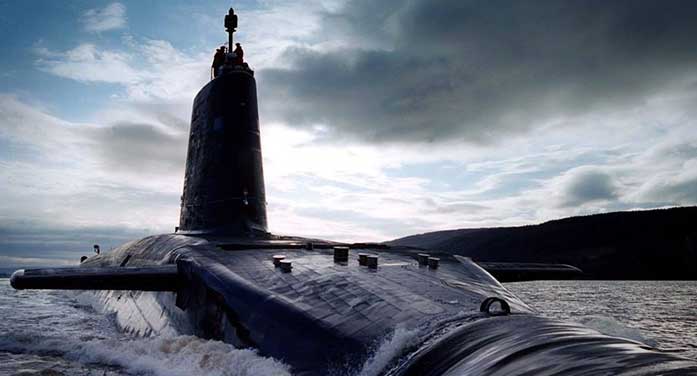 The hasty new geopolitical alliance of Australia, the United Kingdom and the United States (AUKUS) is clearly a change of strategy designed to enhance security in the Indian and Pacific Oceans.
The hasty new geopolitical alliance of Australia, the United Kingdom and the United States (AUKUS) is clearly a change of strategy designed to enhance security in the Indian and Pacific Oceans.
The alliance envisages the United States and Great Britain providing Australia with the technology to develop nuclear-powered submarines, among other things.
The U.S. is showing that it intends a dynamic return to a zone of great strategic importance in order to defend its interests and those of its allies.
The U.S. intends to limit China’s influence in the Pacific Ocean, the Indian Ocean, the South China Sea and the Indochina Basin. It is redeploying its forces on the world chessboard to face China, the country perceived as the biggest threat to American world supremacy.
Great Britain, meanwhile, is trying to strengthen its global role and launch a new geopolitical identity – that of World Britain – as it becomes more active in the South Asia and Pacific zones.
| RELATED CONTENT |
| Five Eyes’ influence challenged by the emergence of the Quad By William A. Stoltz |
| A guide to creating a muscular Canadian foreign service By Randolph Mank |
| China’s economic interests limit the effectiveness of its threats By Luke Patey |
And Australia shares the Anglo-American concerns about the growing power of China.
The U.S. needed swift geopolitical action in the wake of its messy withdrawal from Afghanistan. So it turned to the Anglo-Saxon countries – with which it has strong linguistic and cultural ties – while excluding other powerful nations that have interests in the area.
Australian Prime Minister Scott Morrison, U.K. Prime Minister Boris Johnson and U.S. President Joe Biden emphasized in a statement that the pact was “an investment in our greatest source of strength, our alliances.”
France was excluded from the partnership, despite having significant geopolitical interests in the Indian and Pacific regions. It has about 7,000 troops and nearly two million civilians in its island territories, such as New Caledonia and French Polynesia.
AUKUS provides for co-operation in many areas of defence and technology, including the acquisition of cruise missiles. But its most important aspect concerns nuclear-powered submarines, which will be built in Adelaide, South Australia, with the involvement of the U.S. and Britain.
These submarines are much more difficult to detect than conventional ones. They are super arms with state-of-the-art technology that the two countries have pledged since 1958 not to release to each other.
Under the AUKUS agreement, at least eight nuclear-powered submarines will be built. But it’s not clear when they will join the Australian Navy. Australia has no nuclear infrastructure so the process will be slow. The submarines won’t carry nuclear weapons, Morrison has said.
China accused the United States of taking action reminiscent of the Cold War. And the whole planet seems to be watching the two most powerful nations prepare for all possibilities, even that of a military conflict.
The sale of these eight nuclear submarines to Australia doesn’t violate nuclear proliferation treaties. But if this agreement finds imitators among countries negotiating their nuclear capabilities, such as Iran, the situation will become even more complicated.
Most of the Indian Ocean and Pacific Ocean nations concerned about China’s growing aggression are looking to the United States, not France, to balance Chinese power. So Japan and India, the two largest economies in the region outside of China, have welcomed AUKUS. Singapore, which has always carefully balanced its relations with the United States and China, also welcomed the agreement. New Zealand has also made positive comments about the new alliance and the role it can play.
On the other hand, the deal has divided America’s European allies. “The elementary principles of any alliance are solidarity and transparency. We are witnessing a complete lack of transparency and solidarity here,” said European Council President Charles Michel.
Australia’s cancellation of an order of 12 Barracuda nuclear submarines, worth US$90 billion, clearly hurts the French shipbuilding industry and its broader economy. And the anger felt within the French government simply serves to worsen the crisis at a critical juncture.
And the sudden withdrawal of the United States from Afghanistan, seemingly without taking into account the concerns of its allies, is creating new security issues in a wider region.
Ultimately, is AUKUS essential to contain China?
The real dimensions and the long-term impact of this alliance aren’t yet visible.
But the short-term disorder among Western nations will be very difficult to reverse quickly.
Isidoros Karderinis’ articles have been published in newspapers, magazines and websites around the world. His books have been translated and published in the United States, Great Britain, Italy and Spain.
Isidoros is a Troy Media Thought Leader. For interview requests, click here.
The views, opinions and positions expressed by columnists and contributors are the authors’ alone. They do not inherently or expressly reflect the views, opinions and/or positions of our publication.
© Troy Media
Troy Media is an editorial content provider to media outlets and its own hosted community news outlets across Canada.


